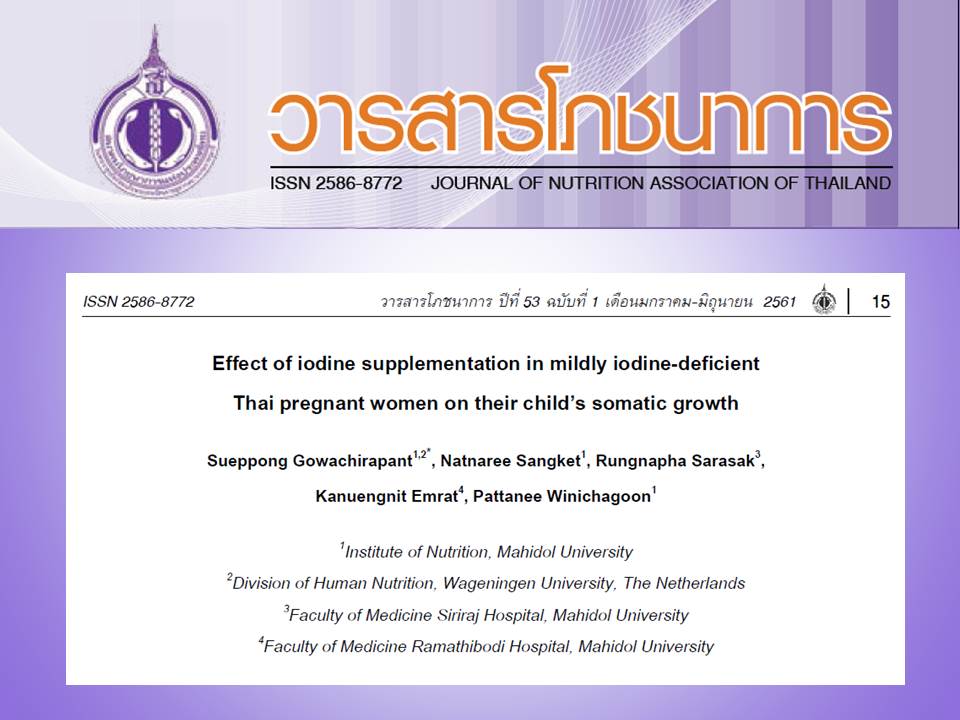Effect of iodine supplementation in mildly iodine-deficient Thai pregnant women on their child’s somatic growth
Keywords:
Water Quality Monitoring, Phraphimonracha Canal, Sainoi Floating Market, Iodine supplementation, Pregnant women, Somatic growthAbstract
Thyroid hormones are essential for human growth. Iodine deficiency during pregnancy may reduce thyroid hormones level and causes growth retardation in children. The objective of this study is to determine the effects of daily 200 µg iodine supplementation in mildly iodine-deficient Thai pregnant women (median urinary iodine concentration <150 µg/L) on their child’s somatic growth. Five hundred and fourteen pregnant women were randomized to participate in a randomized double-blind placebo-controlled trial (RCT) at Ramathibodi hospital. Pregnant women received daily 200 µg iodine or placebo until term. Gestational age at delivery and birth outcomes were collected from hospital record. Anthropometric measurements of the children (weight, height and head circumference) were performed at 1, 2 and 5-6 years of age (between November 2008 and July 2016). The same median gestational age at delivery in both groups was reported (39 weeks) (p>0.05). There were no significant differences in mean birth weight, length and head circumference between the two groups (p>0.05). At 1, 2 and 5-6 years of age, all anthropometric data in children did not differ significantly between groups (p>0.05). The percentage of preterm delivery and low birth weight were higher in the placebo group (4.8% and 4.0%, respectively) than in the iodine group (3.2% and 3.2%, respectively), but had no significant difference. Daily supplementation of 200 µg iodine in mildly iodine-deficient Thai pregnant women did not significantly improve their child’s somatic growth. However, a trend toward a beneficial effect on prevalence of preterm delivery and low birth weight was observed.
References
2. Zimmermann MB, Jooste PL, Pandav CS. Iodine-deficiency disorders. The Lancet. 2008;372:1251-62.
3. LeungAS, MillarLK, KooningsPP, MontoroM, MestmanJH. Perinatal outcome in hypothyroid pregnancies. Obstet Gynecol. 1993;81:349-53.
4. Casey BM, Dashe JS, Wells E, McIntire DD, Byrd W, Leveno KJ, et al. Subclinical hypothyroidism and pregnancy outcomes. Obstet Gynecol. 2005;105:239-45.
5. Abalovivh M, Gutierrez S, Alcaraz G, Maccallini G, Garcia A, Levalle O. Overt and subclinical hypothyroidism complicating pregnancy. Thyroid. 2002;12:63-7.
6. DasS C, Mohammed AZ, Al-Hassan S, Otokwula AA,Isichei UP. Effect of environmental iodine deficiency (EID) on fetal growth in Nigeria. Indian J Med Res. 2006;124:535-44.
7. Allan WC, Haddow JE, Palomaki GE, Williams JR, Michell ML, Hermos RJ, et al. Maternal thyroid deficiency and pregnancy complications for population screening. J Med Screen. 2000;7:127-30.
8. WHO/UNICEF/ICCIDD. Assessment of iodine deficiency disorders and monitoring their elimination. 3rd ed. Geneva: WHO; 2007.
9. Winichagoon P. Thailand nutrition in transition: situation and challenges of maternal and child nutrition. Asia Pac J Clin Nutr. 2013;22:6-15.
10. Chaouki ML, Benmiloud M. Prevention of iodine deficiency disorders by oral administration of lipiodol during pregnancy. Eur J Endocrinol. 1994;130:547-51.
11. Alvarez-Pedrerol M, Guxens M, Mendez M, Canet Y, Martorell R, Espada M, et al. Iodine levels and thyroid hormones in healthy pregnant women and birth weight of their offspring. Eur J Endocrinol. 2009;160:423-9.
12. Mason JB, Deitchler M, Gilman A, Gillenwater K, Shuaib M, Hotchkiss D, et al. Iodine fortification is related to increased weight-for-age and birthweight in children in Asia. Food Nutr Bull. 2002;23:292-308.
13. Farebrother J, Naude CE, Nicol L, Andersson M, Zimmermann MB. Iodised salt and iodine supplements for prenatal and postnatal growth: a rapid scoping of existing systematic reviews. Nutr J. 2015;14:89.
14. Gowachirapant S, Jaiswal N, Melse-Boonstra A, Galetti V, Stinca S, Mackenzie I, et al. Effect of iodine supplementation in pregnant women on child neurodevelopment: a randomized, double-blind, placebo-controlled trial. Lancet Diabetes Endocrinol. 2017;5:853-63.
15. World Health Organization. Preterm birth overview [Internet]. 2017 [updated 2017 November; cited 2018 March 1]. Available from: https://www.who.int/mediacentre/factsheets/fs363/en/.
16. World Health Organization. Global nutrition targets 2025: low birth weight policy brief [Internet]. 2018 [cited 2018 March 1]. Available from: https://www.who.int/nutrition/publications/ globaltargets2025_policybrief_lbw/en/.
17. Alexander GR, Himes JH, Kaufman RB, Mor J, Kogan M.A United States national reference for fetal growth. Obstet Gynecol. 1996;87:163-8.
18. World Health Organization. The WHO child growth standards [Internet]. 2018 [cited 2018 March 1]. Available from: https://www.who.int/childgrowth/standards/en/.
19. Luangkwan S, Vetchapanpasat S, Panditpanitcha P, Yimsabai R, Subhaluksuksakorn P, Loyd RA, et al. Risk factors of small for gestational age and large for gestational age at Buriram hospital. J Med Assoc Thai. 2015;98(Suppl.4):S71-S78.
20. Pretell EA, Torres T, Zenteno V, Cornejo M. Prophylaxis of endemic goiter with iodized oil in rural Peru: preliminary report of the effect on the development of newborn children. In: Stanbury JB, Kroc RL, eds. Human development and the thyroid gland. New York, NY: Plenum Publishing Corporation, 1972:246-65.
21. Laron Z. Interactions between the thyroid hormones and the hormones of the growth hormone axis. Pediatr Endocrinol Rev. 2003;2:244-9.
22. Robson H, Siebler T, Shalet SM, Williams GR. Interactions between GH, IGF-I, glucocorticoids, and thyroid hormones during skeletal growth. Pediatr Res. 2002;52:137-47.
23. Ceda GP, Fielder PJ, Donovan SM, Rosenfeld RG, Hoffman AR. Regulation of insulin-like growth factor-binding protein expression by thyroid-hormone in rat Gh3 pituitary-tumor cells. Endocrinol. 1992;130:1483-9.
24. Ezzat S, Laks D, Oster J, Melmed S. Growth-hormone regulation in primary fetal and neonatal rat pituitary cell-cultures—the role of thyroid-hormone. Endocrinol. 1991;128:937-43.
25. Samuels MH, Wierman ME, Wang C, Ridgway EC. The effect of altered thyroid status on pituitary-hormone messenger ribonucleic-acid concentrations in the rat. Endocrinol. 1989;124:2277-82.
26. Crew MD, Spindler SR. Thyroid hormone regulation of the transfected rat growth hormone promoter. J Biol Chem. 1986;261:5018-22.
27. Hochberg Z, Bick T, Harel Z. Alterations of human growth-hormone binding by rat-liver membranes during hypothyroidism and hyperthyroidism. Endocrinol. 1990;126:325-9.

Downloads
Published
How to Cite
Issue
Section
License
Upon acceptance of an article, copyright is belonging to the Nutrition Association of Thailand.


